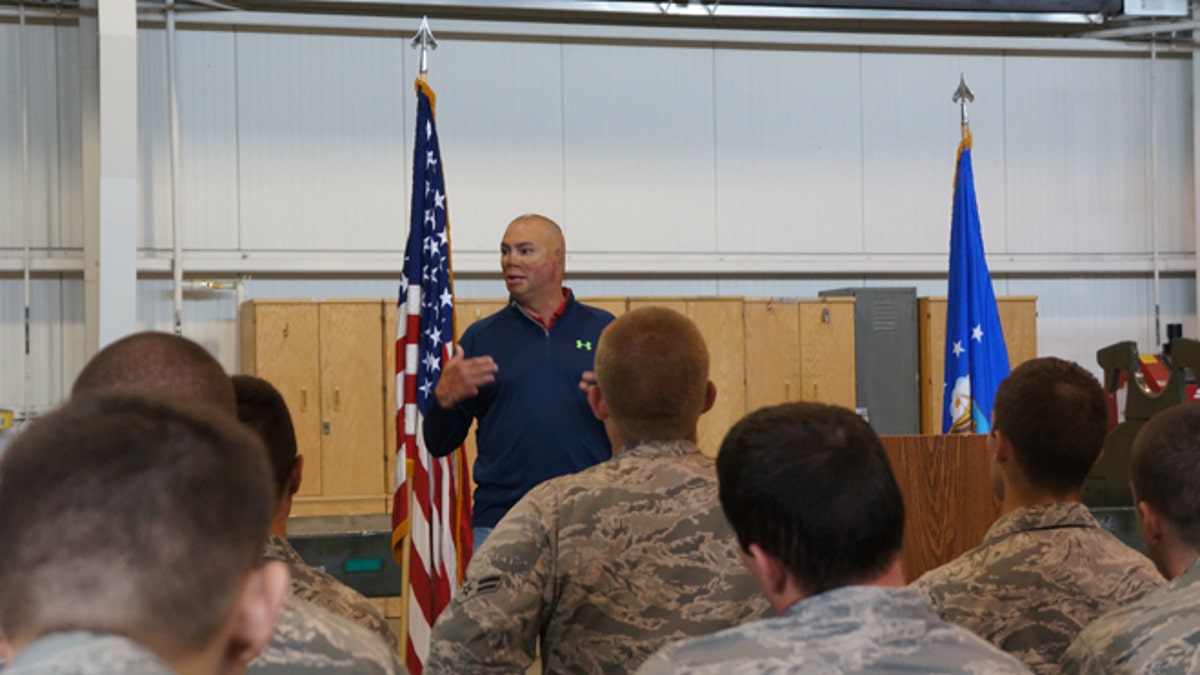
Author Shilo Harris speaks at Minot Air Force Base in North Dakota. (Courtesy of American300.org.)
One morning before heading into my office in San Antonio, I overslept. When I awoke, the house was silent. I couldn’t recall anyone telling me good morning, goodbye, or have a good day. My mind was blank. I was in a bad place.
I went into the bathroom and grabbed my pistol from the top shelf. I cocked the gun and put the cold steel barrel in my mouth. I stared in the mirror and saw a man who was not me. I began to cry and broke down on the floor, cradling my head in my hands.
My name is Shilo Harris, and though I am no longer fighting overseas, I am constantly at war with PTSD.
[pullquote]
There are some folks who feel PTSD is not a real diagnosis—that the problems are mental and emotional and therefore only minor.
I know firsthand that it’s real, and having lost my ears, part of my nose, some fingers and over a third of the skin on my body, I know PTSD to be even more life altering than my physical injuries.
If you can imagine rushing down a dirt trail, trying to beat off a ragged pack of dogs that are eating the contents of your comrade’s head that has been severed and blown from his body, then you may have some small inkling of why that soldier has trouble sleeping at night. If you can imagine washing blood off your armored vehicle, knowing it came from the veins of someone you loved and served with, you might understand why a soldier has lost his train of thought.
A moment will trigger a memory; the memory will trigger a horror; the horror will leave you weak at the knees.
Every soldier returning from battle carries the trauma of that war with him or her every day, physically wounded or not.
According to the Veterans Health Administration, more than 350,000 veterans were seen for potential or provisional PTSD at VHA facilities following their return from Iraq or Afghanistan.
How soldiers choose to self-medicate varies. Alcohol, cruelty, and rage are all coping mechanisms I’ve personally resorted to, though none provide relief. And while I know it’s selfish, suicide stays on the table and at times seems like a delicious choice. PTSD makes suicide seem viable.
The number of male veterans under 30 ending their own lives grew by 44 percent in just two years (2009-2011). The suicide rate among veterans remains well above that for the general population, with roughly 22 former servicemen and women committing suicide every day.
While not all suicides can be directly related to PTSD, it remains a very real problem and a very difficult war. I hate to see that battle lost.
I cannot stress enough the importance for the community to acknowledge that PTSD is real, and for education on suicide prevention and veteran support. In my darkest moments, I visited privately with my pastor and my VA counselor. They both realized I would need help at times when I was traveling, so they made sure I could reach them day or night.
Many hospital staffers will simply ask someone if they’re OK, and allow that individual to vent right then and there. An impromptu counseling session. I was a warrior that received that kind of session and remember feeling so relieved after. I didn’t need an appointment. I didn’t have to wait for someone to have time for me. It happened right when I needed it the most.
I wish I could tell you how to help, but it’s not that simple. You have to reach out; do the work of contacting and building relationships with the veterans around you.
Don’t assume they have a support system. Don’t assume they’re OK. Just because you see them in church Sunday morning doesn’t mean they don’t want to take their own lives on Sunday night.
Help is out there. I want wounded warriors and their family members to trust me when I say this. PTSD is all about stress and trauma. If we understand this and reach out to veterans to ensure they know that there are healthy alternatives for dealing with stress and trauma, we can bring about healing.
This Veteran’s Day, let’s honor all our soldiers and veterans with a commitment to take the reality of PTSD seriously. Make the effort to come alongside veterans who are fighting a never-ending war. The fight is theirs, but knowing they have a reason to fight is half the battle.
